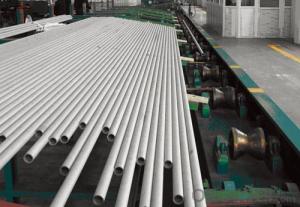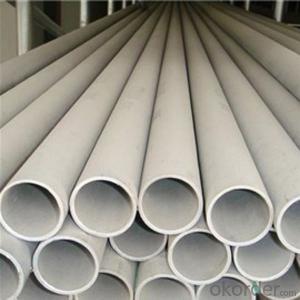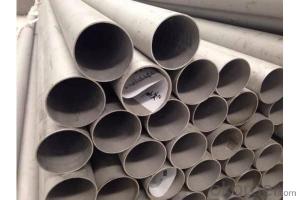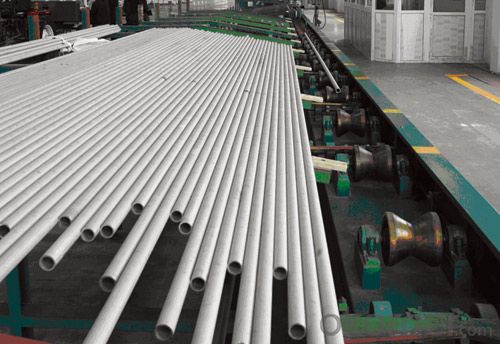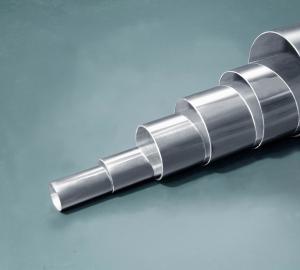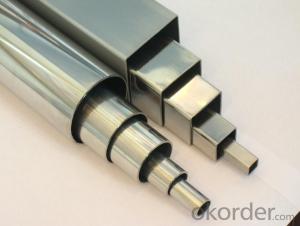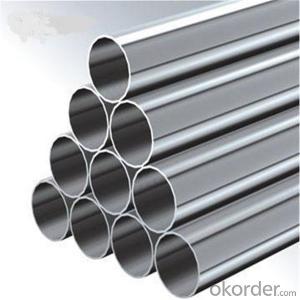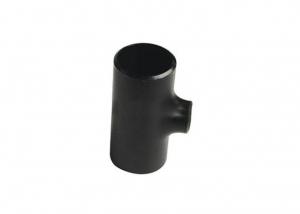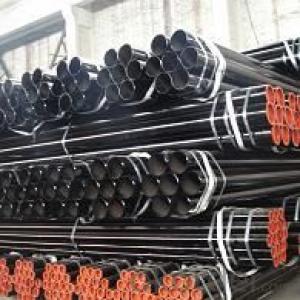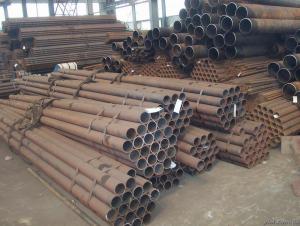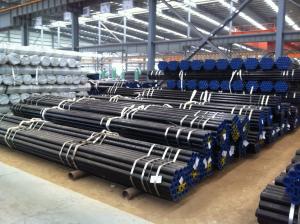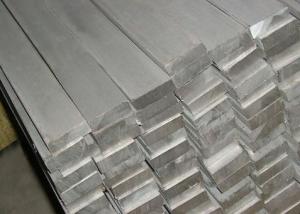Stainless Duplex seamless Steel Pipe 2507
- Loading Port:
- Ningbo
- Payment Terms:
- TT OR LC
- Min Order Qty:
- 1 m.t.
- Supply Capability:
- 5000 m.t./month
OKorder Service Pledge
OKorder Financial Service
You Might Also Like
1、Structure of Stainless Duplex seamless Steel Pipe 2507 Description:
Stainless steel pipe and tubing are used for a variety of reasons: to resist corrosion and oxidation, to resist high temperatures, for cleanliness and low maintenance costs, and to maintain the purity of materials which come In contact with stainless. The inherent characteristics of stainless steel permit the design of thin wall piping systems without fear of early failure due to corrosion.
2、Main Features of Stainless Duplex seamless Steel Pipe 2507:
• High manufacturing accuracy
• High strength
• Small inertia resistance
• Strong heat dissipation ability
• Good visual effect
•Reasonable price
3、Stainless Duplex seamless Steel Pipe 2507 Images:
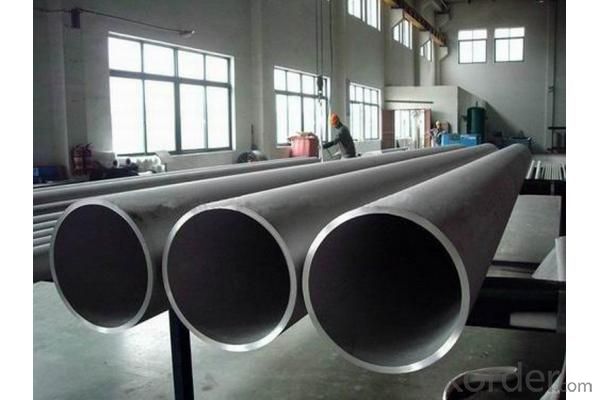
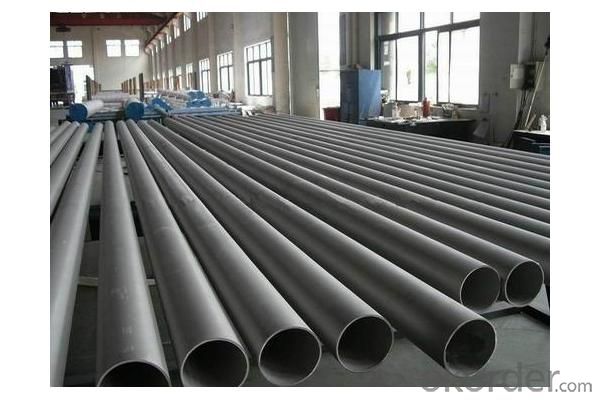
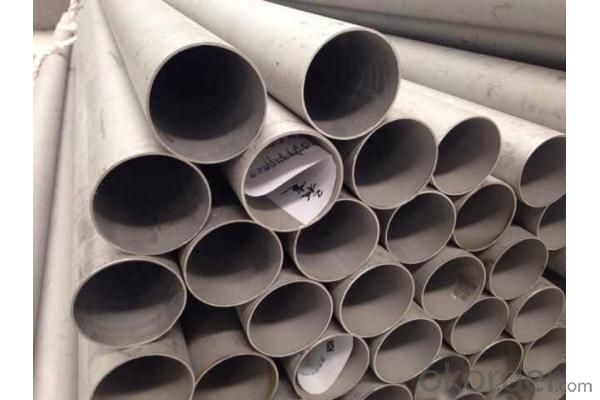
4、Stainless Duplex seamless Steel Pipe 2507 Specification:
Features:
Austenitic duplex Seamless Steel Pipe
Standard:S31803 S32304
Features:
2507 duplex Seamless Steel Pipe /tube
Standard:S31803 S32304
We export main products include Stainless Steel Pipe,seamless stainless steel pipe,welded
Stainless Steel Pipe and so on .
seamless duplex stainless Steel Pipe:
1) Type: austenitic.
2) Process method:cold drawn orcold roll with cold filtered.
3) Standard: S31803 S32304
4) Diameter: 2mm to 910mm.
5) Wall thinkness: 0.5mm to 45mm.
6) Applications: petrol-chemical project, food industry,heat exchanger,nuclear power
station,offshore platform,electric power industry and etc.
Outer packing
In bundles or seaworthy wooden cases.
5、FAQ of Stainless Duplex seamless Steel Pipe 2507:
①How is the quality of your products?
Our products are manufactured strictly according to national and internaional standard, and we take a test
on every pipe before delivered out. If you want see our quality certifications and all kinds of testing report, please just ask us for it.
Guaranteed: If products’ quality don’t accord to discription as we give or the promise before you place order, we promise 100% refund.
②How about price?
Yes, we are factory and be able to give you lowest price below market one, and we have a policy that “ for saving time and absolutely honest business attitude, we quote as lowest as possible for any customer, and discount can be given according to quantity”,if you like bargain and factory price is not low enough as you think, just don’t waste your time.Please trust the quotation we would give you, it is professional one.
③Why should you chose us?
Chose happens because of quality, then price, We can give you both.Additionally, we can also offer professional products inquiry, products knowledge train(for agents), smooth goods delivery, exellent customer solution proposals.Our service formula: good quality+good price+good service=customer’s trust
SGS test is available, customer inspection before shipping is welcome, third party inspection is no problem.
Any question, pls feel free to contact us !
- Q: What is the significance of the schedule in stainless steel pipes?
- The schedule in stainless steel pipes refers to the thickness of the pipe walls. It is significant because it determines the pipe's strength, pressure resistance, and suitability for different applications. Different schedules are used for various purposes, such as high-pressure or corrosive environments, ensuring the appropriate performance and durability of the stainless steel pipes.
- Q: Classification, advantages and disadvantages of stainless steel welding
- The utility model has the advantages of universal use and easy operation, and is mainly regulated by people, and the welding seam material is an electric welding strip. Manual welding can weld almost all of the material, even outdoors, so it has good adaptability and is usually powered by direct current.Welding, either titanium type electrode, can also be sealed. The titanium electrode is easy to weld, the welding seam is beautiful, and the welding slag is easy to remove. But the drawback is that if you do not use it for a long time, you must bake it again to prevent moisture accumulation.
- Q: Can stainless steel pipes be used for firefighting systems?
- Yes, stainless steel pipes can be used for firefighting systems. Stainless steel is a durable and corrosion-resistant material, making it suitable for such applications where durability and resistance to heat and pressure are required.
- Q: Where is the difference between seamless steel pipe and welded pipe?
- The steel tube is a hollow steel strip, used as pipe conveying fluid, such as oil, gas, water, gas, steam, in addition, the bending and torsional strength of the same, the weight is light, so it is widely used in the manufacture of machinery parts and engineering structures. It is also used to produce all kinds of conventional weapons, guns, shells and so on.
- Q: Are stainless steel pipes suitable for food storage tanks?
- Yes, stainless steel pipes are highly suitable for food storage tanks. Stainless steel is known for its excellent corrosion resistance, making it ideal for storing food and beverages. Unlike other materials, stainless steel pipes do not leach any harmful substances into the stored food, ensuring its safety and quality. Additionally, stainless steel pipes are easy to clean and maintain, which is crucial for maintaining proper hygiene in food storage tanks. They are also durable and can withstand high temperatures, ensuring the longevity and reliability of the tanks. Overall, stainless steel pipes are the preferred choice for food storage tanks due to their sanitary properties, corrosion resistance, and durability.
- Q: How do stainless steel pipes compare to titanium pipes?
- Stainless steel pipes and titanium pipes exhibit distinct characteristics, catering to diverse applications based on specific needs. In terms of strength, titanium pipes generally outperform stainless steel pipes. Titanium possesses an impressive strength-to-weight ratio, making it an ideal choice for lightweight yet strong materials. Conversely, stainless steel is renowned for its excellent tensile strength and durability, albeit being relatively heavier than titanium. Regarding corrosion resistance, both stainless steel and titanium pipes demonstrate high resistance to corrosion. Nevertheless, titanium pipes offer superior corrosion resistance, particularly in aggressive environments like seawater or chemical processing applications. Stainless steel pipes also possess good corrosion resistance but might require additional coatings or treatments to enhance their resistance in certain conditions. Temperature resistance is another crucial aspect to consider. Titanium pipes can endure high temperatures without compromising their strength or structural integrity, making them suitable for high-temperature applications in industries such as aerospace or power generation. Stainless steel pipes also exhibit decent heat resistance, but their performance may vary depending on the specific grade of stainless steel and the temperature range involved. Cost is an essential factor as well. Generally, stainless steel pipes are more cost-effective compared to titanium pipes. Titanium, due to its scarcity, intricate fabrication process, and higher production costs, is a pricier material. Hence, if cost is a significant consideration, stainless steel pipes emerge as a more viable option. In conclusion, stainless steel pipes and titanium pipes possess their own merits and aptitude for distinct applications. Titanium pipes excel in terms of strength, corrosion resistance, and heat resistance but come at a higher cost. Stainless steel pipes offer satisfactory strength, corrosion resistance, and cost-effectiveness. Ultimately, the selection between the two relies on the specific requirements, budget, and intended application of the pipes.
- Q: Can stainless steel pipes be used for solar power systems?
- Yes, stainless steel pipes can be used for solar power systems. Stainless steel is a commonly used material in solar power systems due to its durability, corrosion resistance, and high temperature tolerance. It is often used for the construction of solar water heaters, solar thermal collectors, and solar panel frames.
- Q: What is the difference between 321 and 321H stainless steel pipes?
- The main difference between 321 and 321H stainless steel pipes lies in their carbon content and resulting mechanical properties. Both grades are stabilized austenitic stainless steels with titanium as the stabilizing element. However, 321H contains a higher carbon content compared to 321. The increased carbon content in 321H provides improved high-temperature strength and creep resistance. This makes 321H suitable for applications where elevated temperatures are involved, such as in the manufacturing of heat exchangers, furnace parts, and other high-temperature equipment. On the other hand, 321 stainless steel pipes are commonly used in applications that do not require exposure to high temperatures. They offer excellent resistance to intergranular corrosion and are frequently used in the aerospace industry, as well as for the fabrication of exhaust systems, chemical processing equipment, and other general-purpose applications. In summary, the difference between 321 and 321H stainless steel pipes lies in their carbon content and resulting mechanical properties. 321H is specifically designed for high-temperature applications, while 321 is suitable for general-purpose applications that do not require exposure to elevated temperatures.
- Q: How do you calculate the pipe volume for a specific application?
- In order to determine the volume of a pipe for a specific application, several important factors must be taken into consideration. Initially, it is necessary to ascertain either the inner diameter (ID) or the outer diameter (OD) of the pipe, depending on the information available. Typically, the diameter is measured in inches or millimeters. Subsequently, the length of the pipe needs to be measured, which can be accomplished in either feet or meters. Once the diameter and length have been obtained, the formula for calculating the volume of a cylinder can be utilized to determine the pipe volume. This formula is expressed as V = π * r^2 * h, where V represents the volume, π denotes a mathematical constant approximately equal to 3.14159, r signifies the radius of the pipe (which is equal to half of the diameter), and h represents the length of the pipe. If the ID is known, the radius can be directly calculated as half of the ID. However, if the OD is provided, it is necessary to subtract the pipe's wall thickness from the OD in order to find the ID and subsequently calculate the radius. Once the values have been substituted into the formula, the pipe volume can be solved for. The resulting volume will be expressed in either cubic inches or cubic meters, depending on the units used for the diameter and length.
- Q: Can stainless steel pipes handle acidic or alkaline fluids?
- Stainless steel pipes possess the ability to accommodate both acidic and alkaline fluids. Their exceptional corrosion resistance, a renowned attribute of stainless steel, renders them highly suitable for managing aggressive substances. This notable quality stems from the presence of chromium, which interacts with oxygen and generates a thin protective layer on the steel's surface, effectively halting further corrosion. This passive layer remains steadfast in both acidic and alkaline environments, furnishing long-lasting protection against corrosive fluids. However, the level of corrosion resistance may fluctuate depending on the specific stainless steel grade employed, as well as the fluid's concentration and temperature during transport. Consequently, it becomes crucial to meticulously select the appropriate stainless steel grade and duly consider factors like temperature, concentration, and potential exposure to other corrosive substances when opting for stainless steel pipes for the handling of acidic or alkaline fluids.
Send your message to us
Stainless Duplex seamless Steel Pipe 2507
- Loading Port:
- Ningbo
- Payment Terms:
- TT OR LC
- Min Order Qty:
- 1 m.t.
- Supply Capability:
- 5000 m.t./month
OKorder Service Pledge
OKorder Financial Service
Similar products
Hot products
Hot Searches
Related keywords
